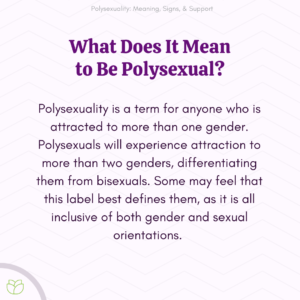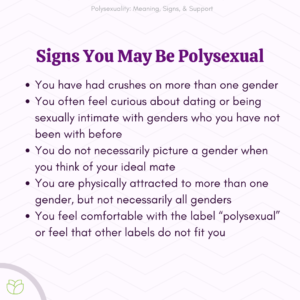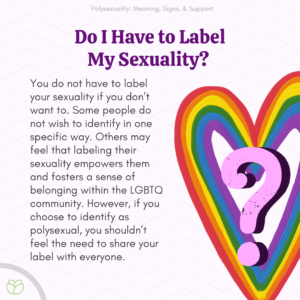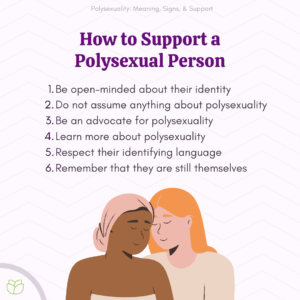The term ‘polysexual’ refers to individuals who are sexually or romantically attracted to multiple genders. However, they may not be attracted to all genders. Polysexuality and bisexuality are labels often used interchangeably, but are two different identities. While there are some common misconceptions about polysexuality, advocating for yourself and loved ones can help spread awareness.
Talkspace - Online Counseling For the LGBTQIA+ Community See a licensed therapist who sees you! Covered by most insurance plans. Visit Talkspace
What Does It Mean to Be Polysexual?
Polysexuality is a term for anyone who is attracted to more than one gender. Polysexuals will experience attraction to more than two genders, differentiating them from bisexuals. Some may feel that this label best defines them, as it is all inclusive of both gender and sexual orientations. For example, a person can be polysexual and gay, cisgender, transgender, or any other identity.
How Polysexuality Relates to Other Sexualities
Polysexuality is often confused with other sexualities, especially by those who view orientation through a binary, two gender lens. Polysexual people can be attracted to all genders, or they may have a preference for one or more. Like any identity, polysexuality is very diverse, with each person experiencing it differently.
Polysexual Vs. Pansexual
Because polysexuals are attracted to many genders, they may be mislabeled as being pansexual, meaning attracted to all genders. However, a polysexual person usually has a preference for some genders over others whereas a pansexual person may not. For example, a polysexual might be only attracted to those on the feminine end of the gender spectrum, whether that person is cis, non-binary, or trans.
Polysexual Vs. Bisexual
The difference between polysexuality and bisexuality comes from the fact that bisexuals are attracted to individuals of their own or opposite gender. While the terms may sound similar, polysexuality is inclusive of all genders, not just two.1
Polysexual Vs. Omnisexual
Someone who is omnisexual is attracted to all genders equally. As mentioned, a polysexual identifying individual might be attracted to all genders, but also have a preference for certain types. “Omnisexual folks see gender and are still attracted to a variety of people.”2
Polysexuality Vs. Polyamory
Polysexuality defines one’s sexuality while polyamory is a style of consensual relationships. These are two different elements of one’s life. Someone can be both polysexual and polyamorous, or polysexual and monogamous with only one partner.
Polysexuality Myths & Misconceptions
It is not uncommon for polysexual individuals to face stigma for simply being polysexual. Other myths and misconceptions about their identity can make this experience even more upsetting. Because of these harmful beliefs, it can be challenging for polysexual individuals to feel comfortable expressing themselves to others.
Common misconceptions about polysexuality include:
- Polysexual people are promiscuous: It is sometimes believed that because polysexual people are attracted to multiple genders, they will also be promiscuous. This myth is perpetuated by the media, which often depicts polysexual or bisexual people as being such.
- Polysexual people cheat more: One of the most harmful stereotypes is that polysexual people cheat more in relationships than others. This misconception stems from biphobia and biases against those who are not heterosexual. Many believe that polysexuals will get bored of being with one gender and thus cheat with another.3
- Polysexual people are confused: It is a common myth that polysexual people are confused about their identity. This is another stereotype based on heteronormative cultural biases. Ascribing to this myth is dangerous, as invalidating a person’s sexuality can greatly impact their mental health.
- Polysexual people are dishonest: “Society fosters extreme biphobia, encouraging people to view bisexual people as insatiably sexual, fickle, and untrustworthy.”4
Top Rated Online Therapy Services BetterHelp – Best Overall “BetterHelp is an online therapy platform that quickly connects you with a licensed counselor or therapist and earned 4 out of 5 stars.” Visit BetterHelp Talkspace – Online Counseling For the LGBTQIA+ Community See a licensed therapist who sees you! Covered by most insurance plans. Visit Talkspace
Signs You May Be Polysexual
Sexuality is a spectrum and experienced differently by everyone, including polysexuality. A person’s orientation will appear in ways unique to them. It is not unusual to be sexually fluid or change the definition of your polysexuality over time, especially as you mature and become more self-aware. With the social climate shift and more information about polysexuality becoming available, you may find you fit within this umbrella.
Below are signs that you might be polysexual:
- You have had crushes on more than one gender.
- You often feel curious about dating or being sexually intimate with genders who you have not been with before.
- You do not necessarily picture a gender when you think of your ideal mate.
- You are physically attracted to more than one gender, but not necessarily all genders.
- You feel comfortable with the label “polysexual” or feel that other labels do not fit you.
Do I Have to Label My Sexuality?
You do not have to label your sexuality if you don’t want to. Some people do not wish to identify in one specific way. Others may feel that labeling their sexuality empowers them and fosters a sense of belonging within the LGBTQ community. However, if you choose to identify as polysexual, you shouldn’t feel the need to share your label with everyone.
You can share the labels that you feel describe you with friends or family who you want to be open with. You don’t have to share these with everyone, even those who are in your inner circle. You might be especially cautious about sharing your identity in the workplace, as this can cause discrimination that might be difficult to overcome. There is no reason to put yourself in a position of having to answer uncomfortable or judgmental questions.
How to Talk to Your Loved Ones About Your Sexuality
The coming out process is personal and unique. However, not everyone will choose to come out to friends, family members, or other people. It is important to remember that coming out is your choice and there is no set path you need to follow. There is no specific time or age to come out by–whether you choose to or not.
If you are scared about telling someone you are polysexual, even if they’re a parent, listen to your better judgment and make a decision that ensures you feel safe and comfortable. Additionally, it can be helpful for a polysexual couple to work through the changes in their relationship and expectations with the help of a therapist.
Being true to oneself requires self-understanding and emotional strength. A therapist can help support your journey. BetterHelp has over 20,000 licensed therapists who provide convenient and affordable online therapy. BetterHelp starts at $65 per week. Take a Free Online Assessment and get matched with the right therapist for you.
How to Support a Polysexual Person
Many people wonder how to best support their loved one when they come out as polysexual. Advocating for the rights and inclusions of all LGBTQ persons, as well as being open minded and respectful, are some valuable ways to start doing this.
Below are some ways you can support a polysexual person:
- Be open minded: Showing that you are open and accepting will make someone more likely to disclose their sexuality, or “come out” to you.
- Do not assume anything: Don’t make assumptions about your loved one’s identity. Ask questions about who they are attracted to, their preferred pronouns, and other inclusive information.
- Be an advocate: Showing support goes beyond how you talk to and about LGBTQ individuals–spreading awareness and acceptance is also an important aspect. Speak respectfully and advocate for LGBTQ rights and inclusion.
- Learn more about polysexuality: Some individuals who identify as polysexual may fear judgment from others about their identity based on lack of knowledge or misconceptions. Showing you are open to learning more about their orientation will help your loved one feel safe and appreciated.
- Respect their identifying language: Not every polysexual person identifies the same way, and respecting their identifying language shows you are being supportive.
- Remember that they are still themselves: While sexuality is an important aspect of a person’s identity, they are not defined by it. Letting them know that you support them, regardless of their sexuality, is essential when supporting a polysexual identifying loved one.
How Therapy Can Help
If you are feeling confused about your identity or have questions about how to come out, it can be helpful to seek professional help. Consider finding an LGBTQ+ therapist as they will have beneficial knowledge to offer and be understanding of your experiences as a polysexual. If you would prefer at-home rather than in-person sessions, there are many LGBTQ+ online therapy options available. You can start your search using an online therapist directory.
Final Thoughts
If you are exploring your sexuality, it’s important to embrace who you are and surround yourself with friends and loved ones who affirm you and your relationship. If you have continued questions about your polysexual orientation, it may be valuable to speak with a therapist.
To help our readers take the next step in their mental health journey, Choosing Therapy has partnered with leaders in mental health and wellness. Choosing Therapy is compensated for marketing by the companies included below. Online Therapy BetterHelp Get support and guidance from a licensed therapist. BetterHelp has over 20,000 therapists, who provide convenient and affordable online therapy. Complete a brief questionnaire and get matched with the right therapist for you. Get Started Psychiatry, with you in mind Talkiatry Our Psychiatrists Can Diagnose Your Condition, Prescribe Medication, And Monitor Your Progress. Most psychiatry visits cost patients $30 or less* Free Assessment Drinking Moderation Sunnyside Want to drink less? Sunnyside helps you ease into mindful drinking at your own pace. Think lifestyle change, not a fad diet. Develop new daily routines, so you maintain your new habits for life. Take a 3 Minute Quiz Relationship Help OurRelationship (Free Couples Course) OurRelationship has been proven to help couples improve communication, intimacy, and trust. 94% would recommend it to a friend. Get Started Mental Health Support Group App Circles Anytime, anonymous, and free. Never feel alone during life’s greatest challenges. Drop-in to live conversations and share thoughts, ask questions, or learn from others on the same journey. Join Circles Now Mental Health Newsletter A free newsletter from Choosing Therapy for those interested in mental health, therapy and fighting stigma. Sent twice weekly. Sign Up Choosing Therapy Directory You can search for therapists by specialty, experience, insurance or price, and location. Find a therapist today. *Includes all types of patient cost: copayment, deductible, and coinsurance. Excludes no shows and includes $0 Visits.Additional Resources
Online Anxiety Test A few questions from Talkiatry can help you understand your symptoms and give you a recommendation for what to do next. How Does ERP Help With Intrusive Thoughts? Obsessive compulsive disorder (OCD) is a psychiatric condition marked by the presence of obsessive thoughts, images, doubts, or urges, followed by compulsive behaviors or acts aimed at easing the distress caused by the obsession. While the content of the obsessions can take many forms, they are always repetitive, persistent, involuntary, and intrusive, and they often result in a great deal of anxiety for the person experiencing them.










